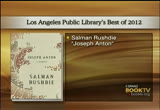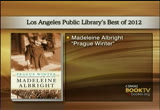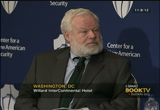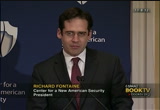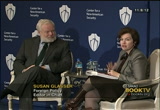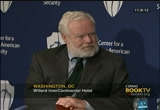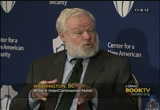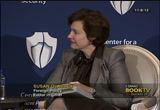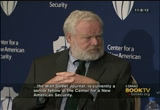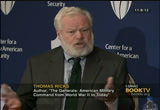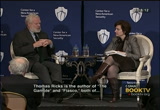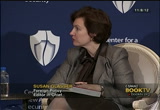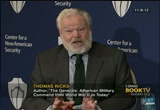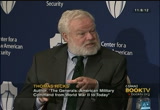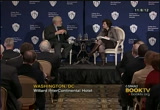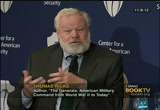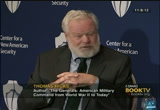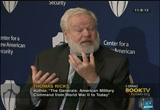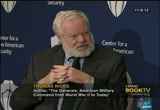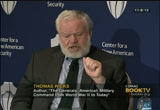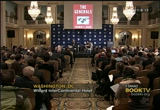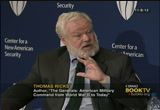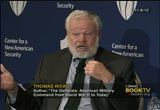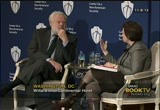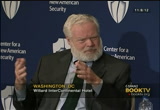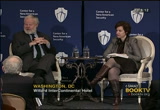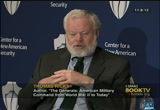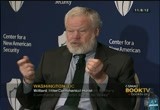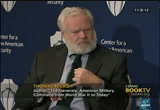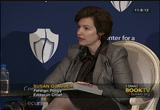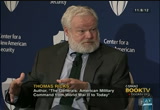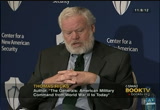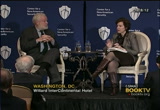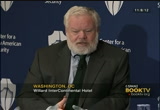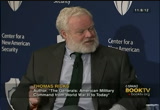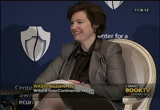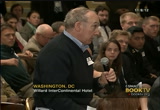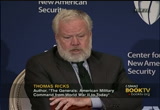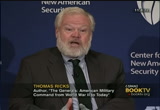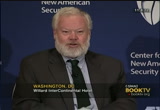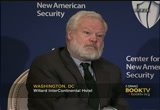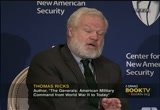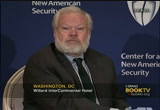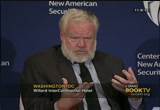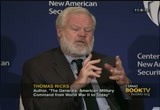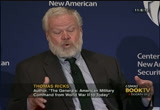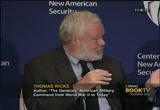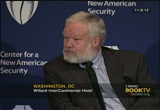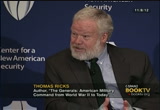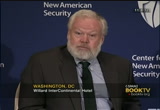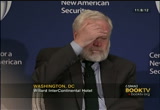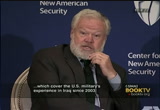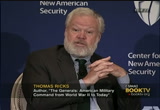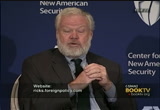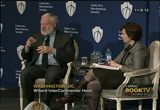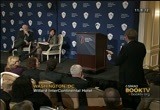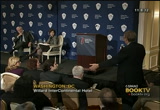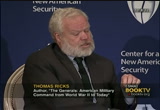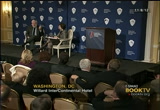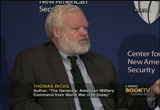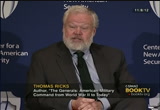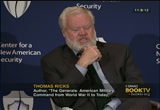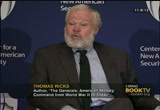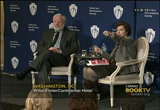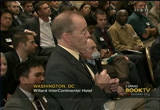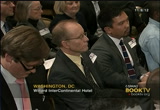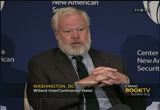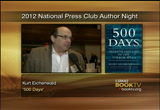tv Book TV CSPAN January 1, 2013 6:45am-8:00am EST
6:59 am
>> it's striking, for example, we have often come with the 11 commanders in afghanistan in 11 years. that's casual arrogance. why would you think that was any way to run a railroad? if you had an american corporation that had 11 ceos in 11 years, what would happen to it? it would fall apart. warren buffett said that you'd been playing -- he said if you'd
7:00 am
been playing poker for have our and you don't who the patsy at the table is, you are the patsy. when you get a commander in every year and rotate every year, every time he goes home he basically make our commander the patsy at the table. he doesn't know where all the bodies are buried. by the time he figures it out he is going home. i can't imagine running a war that way. can you imagine marshall saying to eisenhower january 44, a company that 18 months, time for some else to have a term. marshall and eisenhower made a lot of decisions in 42. they need to make mistakes and learn from them. eisenhower at one point in africa thought he might be relieved. he sent a letter to his son single, that's the nature of the business, don't worry about it. we will all go on. >> that's one of the critiques i've seen about your prescription to the book is a question of if rix wants us to
7:01 am
fire more generals does that mean doesn't tolerate mistakes? by turner to suggest even our greatest leaders made plenty of mistakes on the personal front as well as -- >> you had 155 men elected to be division commanders in combat in the army in world war ii. many hurdles before that. marshall cleaned up 600 senior officers before the war began. officers he considered dead weight. that's the phrase used to frankfurter when frankfurter was talking to him. of the 155 men who commanded divisions in combat in the army in world war ii, 15 were fired. sorry, 16 were fired. of the 16, five were given other divisions in combat later in the war. at least one of my favorite characters, allen, which is where the book began for me. i was on the johns hopkins university site in sicily looking at the american campaign
7:02 am
at sicily in 1943. the grad student talking about terry allen mentioned rather casually at the end of his talk and after the battle was over and the campaign was one, omar bradley fired terry allen. my job dropped. i just come out of iraq where no one got fired. when mediocrity was our goal. and instead i hear about the army firing one of our most effective division commanders in europe our first year in the war. and naturally the threat that began, the book for me, going back and studying this. bob took me inside one day and said we need more about george marshall. a couple years later i'm in the archives, i immersed myself into the marshall papers. really came to admire the guy. i don't think he was a likable guy. the other hero of the book is eisenhower. i think eisenhower is
7:03 am
underrated. the job of managing the allies, of dealing with the british, the french -- >> montgomery was -- >> montgomery is a piece of work. at one point -- montgomery won't come see marshall, so september 10, 1944, i'm sorry, montgomery won't meet ike so ike flies up to brussels. he can't get off the plane because he wrenched his knee. so montgomery comes to see him, pulls out the memoranda and says did you write this? shia rubbish. essentially eisenhower says steady there, i'm the boss. it's fascinating to me how that is a typical relationship of the british and they're realizing that we are replacing them, not only in combat effectiveness but as a superpower. how eisenhower kind of let them
7:04 am
down easily, manages that, doesn't fire montgomery authority sorely came close to do so several times. if you think i'm exaggerating eisenhower's achievement, thing, they have seniority and put george patton in that job. >> things might not done so well spent i think we would've ended up in war with the british. [laughter] >> so after world war ii, are there any heroes or is it a long story of decline? >> no, there are real heroes. there are two others in mind. when his master ridgway. probably marshall's leading producer. he began world war ii, marshall's morning briefer, briefing them on the state of the war. that was basically an intelligence operations brief that was also given to the president or ridgway is a very interesting central figure rising quickly from colonel to lieutenant general in world war ii. but then in korea goes in and turns around that were, really quite quickly.
7:05 am
but my other hero of the korean war is a guy who's almost forgotten today, which is a shame, o. p. smith. o. p. smith, he's a marine general. he's reporting to army generals other than macarthur. it's a fascinating problem because he believes his superior officers are incorrect in their assessment of situation, and in the orders they are giving him. he has to handle a situation in which macarthur wants him to run his marines up to the chinese border, just when he believes the chinese are pouring in to korea. and police correctly, by the way. he handled this extremely way. he said the most important thing a joke and you are all done before the battle begins but i think that's true in o. p. smith case. he does three things. he concentrates his troops on the west side, south side of the chosin reservoir. he lays down a series of -- and
7:06 am
kcs retreat. and has an airstrip and doug so you can plot out his wounded because the wounded can slow you on a retreat. had he not done these things, i think we might very well have lost 15,000 marines at chosin reservoir which would've made it the greatest military disaster in military history many times the size of custer's last stand. and probably would've resulted in one of a few things. either us going nuclear, or -- withdrawing altogether and south korea being a communist state today under north korea. gale, correct me if i'm wrong, is the granddaughter of o. p. smith. but raised by o. p. smith because your father was killed in world war ii. so we have here today the granddaughter, and raised by o. p. smith, of genuine american hero so i would like to give o.
7:07 am
p. smith and you a welcome upon [applause] spent if there's one thing that comes out of this book, -- corrects the notion in the marine quarter. >> for those of you who haven't read the book yet, this is by far the most gripping and still i think unrecognized story. this part of the book is really, it's not -- actually telling a powerful story. is it true as you've just shown force, that you have a soft spot for the marines? he has been accused of being partial to the marines at the expense of the army. barges that the army produces more bad generals? [laughter] >> the army and marine corps are very different but i think the
7:08 am
marine corps still does operate more as a solution, swift relief, and holding commanders accountable just as skippers of vessels are held accountable for everything that happens on the ships. so for example, the only notable relief of the invasion of iraq 2003 was general mattis' release of the regimental commander, colonel dowdy. the reason why cut into -- am glad you asked that because i wanted some and book to dive down to the tactical level. most of the book is at the strategic level of how generals think about war. the first task of the cabana to understand the nature of the conflict in which he is engaged. but somewhere i wanted to see how that could apply the whole way from senior echelon down to battalion company squad fire. chosin reservoir is especially interesting because you almost have a laboratory example. you have the marines on the website of the reservoir. you have the army unit on the
7:09 am
eastside. reinforced regiment. you have the first marine division reinforced by 15,000 marines. so it's a laboratory example comparing decisions made by generals but in this case, not all cases, by the one, -- [inaudible]. not all cases to be deemed to do better than the army. in this case they did, clearly the o. p. smith makes a series of very smart decisions even though he has all meant and macarthur really pushing them in the wrong direction in the kind of reckless fashion. the army unit on the side of chosin reservoir, people forget this, got wiped out. 90% casualty rate. they would only survive because they're able to stagger out on the ice of the reservoir and walked down to the marine lodge four miles to the south. and because a little-known
7:10 am
marine colonel went out with some corpsmen and submarines over the course of several days and pulled in a lot of wounded he found wandering, staggering around modestly on the eyes. while turning focus -- i kind of like this marine colonel. i'm blanking out in his name because one point he he was a relief pitcher in the minor-league. he was hack wilson's teammate i think on hagerstown socks or something, before he was back in the marines. >> in the later years, and the stories of vietnam, iraq, afghanistan to a lesser extent, i think that's really where this question of politics enters civilian oversight versus what you can lay at the doorstep of the military really comes into play. you recount tales of generals were much less than those you just talked about in the later wars. where do you feel the balance lies between the accountability that should of been there but
7:11 am
was missing for the generals in vietnam, are in iraq in its early days, versus the problem of political leaders setting impossible goals or murky goals, and then ultimately firing, you know, only the guys at the very top because things didn't work out politically? >> what, as it has the military loses in korea, because the pentagon says to ridgway, you're going to embarrass us and congress will start asking massive questions, so ridgway wanted to firefight of his division commanders in korea. they basically told and you can do it but do it on the down low. >> pretend its rotation. >> and they basically say, joe collins, the chief of staff is already lied to congress about this, so just keep up the façade. we lose the tradition of relief partly because in the small unpopular message boards is harder to know what success
7:12 am
looks like. yet you can be successful but it's clear to me i think general petraeus was successful during the surge in extricating the united states from iraq, which i think is true mission. in getting us out of the war in one form or another. you've got an interesting pointer which is a secondary theme of the book which is civil military discourse. i want to give a shout out to two people, bob who suffered through reading my manuscript twice, and lieutenant general jim duquette, if he is here. oh, there you are. gym is the exception to everything i'm saying tonight about the generals. [laughter] a couple of things about jim. is now retired. the only channel i know who retired and enrolled in a ph.d at johns hopkins in philosophy, which is a interesting degree. but jim said you would need to think more on the rule of civilians. he was totally right. in the rewrite of the book is
7:13 am
became a major theme. what works, what doesn't work. marshall and was up to me as a model of good civil-military relations, good discourse. they are not particularly friendly spin you say marshall we refuse to have dinner with -- >> didn't like having dinner with them. refuse to laugh at their jokes when fdr referred to as george. he made it clear to his name was general marshall. the first time that marshall ever went to hyde park, roosevelt's home, was for his funeral to be a pallbearer. he kept his distance. yes he was selected for the job because he was candid with roosevelt. before is on the chief of staff, he was a brigadier in the oval office and basically was the kind of blows them off and he says wait a minute, you need to hear me out here as a brigadier general. later as chief of staff he says no, mr. president, you're wrong and let me tell you why.
7:14 am
roosevelt liked that. that's good for the military discourse. it's not people being chummy. it's exploring your assumptions and surfacing your differences and examining them. a big mistake, or iraq, was when general shinseki said we need more troops and everybody said basically know, shut up. why do you think that? as it happens i think shinseki was probably wrong. he said they got twice as many troops operating bad troops operating badly and pissed off iraqis and creating an insurgency, probably getting twice as fast. but the quality of it, jim emphasized to me, you've got to look at both sides. are the honest with each other, or the open with each other? did each other? didn't each other? did they really delved into differences deeply and think about them? for example, assumption going into vietnam. at some point the comments have a breaking point that we will reach before our breaking point. that turned out wrong.
7:15 am
1991, we give saddam hussein a good thumping. he will fall from power. actually turned out saddam hussein thought he won the were. we now know from the papers, he said i don't know why but the americans are getting a cease-fire. and so the end of the 91 war was botched partly because they don't have a thorough examination of the civil military love, and he said having a triumph, we open up a 20 year war with iraq. takes forever to resolve. to me, the real low point is lyndon johnson. lyndon johnson at one point has the joint chiefs into his office and they basically tried to lay down the law and said mr. president, we don't like the way your prosecuting the war. he curses them out in the most vulgar terms, which i won't use because c-span will get mad, and the chiefs leave. casino says i've never been talk to like that in my life.
7:16 am
well, at that point, you put your stars on the table and say, mr. president, you have clearly lost her confidence in me, i am out of here. that's what george bush would have said had fdr spoken like that to him. we know this because once when douglas macarthur told that with roosevelt, roosevelt said douglas, you must not talk to the president like that. so these guys had an understanding back then that we seem to have lost in our senior leaders later on that their job is to speak truth to power. even when it's uncomfortable, especially when it's uncomfortable. >> that's why want to come right back to the iraq war and the current iraq war, and ask you why you think it is, i think, to the extent that has been blamed come a portion, it has rested mostly with bush i would say and with those around him to pursued
7:17 am
the war, the military has not by and large been seen by the public to be accountable for what by any account was an awfully long-term, expensive and not super successful effort to do a country that was far smaller than the u.s. that had nothing like the resources that we have. why has the military not been held accountable? and are there places that explained that? >> i think the first reason is the errors of the bush administration were so huge it it sort of obscures the heirs of the military behind him. we also want to support the troops, so we confuse the support with troops would not criticizing the generals. we invade iraq, recklessly, on false premises. we wasted billions of dollars fighting the war the wrong way for many, many years. and strategically i think we wind up knocking down the
7:18 am
bulwark of power, and we turn over iraq to iran basically. strategically not a good idea either. so the bush administration makes so many mistakes that a thinking kind of lays down a smokescreen through which it's hard to see the military. but i think at this point, asked the melted some tough questions. what have you guys learned? how have you adapted? the romans prided themselves on adopting the tactics of their enemies. it made me stop and think. what enemy tactics have we've adopted? you don't want to adopt random ieds. but it made me wonder, are the things we could've done we should learn that we haven't? as john noggle has famously written about the army needs to be a learning organization, what is a learning, how is a learning? these are the questions we
7:19 am
should be asking. why aren't we asking them? i think a big part of the problem is with, as i said, people not wanting to just the military. second, congress no longer is -- no longer goes on to talk to military. >> that number will go down again in the next congress. >> it will constantly go done. so we kind of have a divide between the 1% to fight the wars and the 99% who really i think generally ignore them these days, especially when they are no longer our wars. iraq even today is more violent than afghanistan but nobody knows that because we don't care. >> it's not our problem anymore as they say, right? i want to make sure we get to questions from this very eager and attentive audience. just quickly though i want of one of my own, which is you pose early on in the book the question of whether the army
7:20 am
went from a model of leadership under martial to one of management and even micromanagement in the '50s and beyond the i was were struck by that because in many ways i think that's the question that gets at the heart of the whole book. and also the question of how the studies are applicable to other large organizations, whether it's business or other parts of the u.s. government. what do you think about that? doesn't a leader have to be a good manager? >> [inaudible] >> i can understand why they do spend i think is probably the first military in history and a while the harvard -. [inaudible] leaders have to be managers but they have to be leaders for most. and one way you laid is to give subordinates responsibility, but then execute. the problem is if you don't have
7:21 am
an organization that optimizes for confidence, you have to micromanage, especially if you can't remove families. so you see the philosophy, commanders are on six-month tours. a lot of them are going through quicker. i remember reading one of the cup is going through five commanders in seven months late in the vietnam war. and if you don't trust your subordinates you hover over them, sometimes literally and helicopters. you have an organization that goes towards mediocrity and stalemate in another way. everybody does it one year tour and do something i made progress on my two or. it's a little different if you're there for three, five or seven years or you are therefore the direction. it's a lot harder to claim progress, steady progress seven years into it. >> the road to success leads to berlin, right. i think you point on early on in the book and you have a pretty good incentive to get as quickly
7:22 am
as -- >> ahold organization has that incentive to take some prudent risk. but if anybody is going on in a year, keep your nose clean, keep your head down and going in the year. and it's not your war anymore. i don't understand vocation. 11 commanders in 11 years in afghanistan? i mean, that's no way doing anything. but you don't want to just -- keep upping but the baseball analogy. all you can do is find the top guy, hearkens and westmoreland india down, casey in iraq come the only tool available to the latest figures like firing the manager of a baseball team every time you start losing. >> [inaudible] >> sometimes you do want to fire the manager, especially bobby valentine. [laughter] but more often all you need is a relief pitcher. [inaudible] spent yes, especially dan fletcher.
7:23 am
>> he's not a baseball manager. >> he's not a manager of anything. he's an owner. [laughter] >> we don't get to fire the owner. >> the first time i've discussion on the redskins into while. >> it might be the last i'm afraid. listen, i know there's a lot of good questions out there. we have people with microphones, please identify yourself, and who you are with and really make it a question. football, baseball, generals speak with i'm here to talk about warfare. i'm elliot, i'm retired and i've read several of your books before this one, and i admire your work. i saw the film about a month ago called follow me, about -- perhaps you've seen it as well. >> no spent i talked to the film maker, and it led me to think
7:24 am
about several models like this. follow me being a model of the infantry soldier, which i endured during the vietnam war when i was in the reserves. and leading from the front, which i think i read about in world war ii, it leads me to the following observation. that rommel met with troops at the front line to find out that candor from candid troops what was happening, and to gain intelligence. is that something you've encountered in these other leaders? >> that's a good question about commanders being after that i think it's clearly one of the measures of a good command at any echelon, are they getting out and about. i think general sanchez did not generally. a number of, i think it was both petraeus and odeo who within division commanders told me that they almost never saw sanchez.
7:25 am
and i think it went up once or twice. basically they saw him if they went into commanders meeting at baghdad which fortunate i was given notes for from all the commanders mean so i could go through them. e-mails. a good contrast would be patristic is that all attempted legal battlefield circulation. in fact, it. just getting out and about. general odierno did so as well when he was with petraeus in baghdad. they also brought in different point of view but it -- what was really striking to in the face of the surge, '07, the different voices you saw around american commanders. you know, and the sky, a pacifist, british, arab specialist, anti-american, anti-military, he was odierno's
7:26 am
political adviser. if you ask general odierno why, because she makes me think carefully. she asks the right question. the other people you saw were also asking iraqis questions. sanchez was in a meeting once in baghdad, and he asked the iraqis a question about what to do in slaughter city. these were three guys from slaughter city. they started talking intensely to each other and said sorry for give offense but they said that's the first time an american has ever asked us what to do instead of telling us. it was four, five years into the war i think. three years into the war. so yeah, getting out and about is a great thing and decide i think of a good commander. [inaudible] spent i am not an expert on the german military. if i did say anything, bob gold with would correct me so i'm not even going to go there. >> let's get some more questions.
7:27 am
>> high, tom. >> hello. >> i want to personally thank you for your support the site, christie, executive director of support which is a nonprofit dedicated to civilian military, but am also an 11 year army why. and without your help i never would've gotten op-ed published for the "washington post" so i thank you for that. you talk a lot about accountability. [inaudible] obviously we are struggling now with some of the mental health issues and the suicides both among servicemembers and i've talked among the wives were killing themselves. i know that wasn't really an issue. generals were not expected to do with that kind of stuff as the way they are now. but i will say from my point of view as a stakeholder, both living it and then being an advocate, i have never heard of a commander at any level being relieved for being a block or,
7:28 am
you know, to a soldier struggling with mental health, you know, we talked a big game about stigma and not allowing that. i think leadership is sending the right message, that in terms of policies and actual accountability, there doesn't seem to be any. >> that's a good point. the other day i was speaking out our great local bookstore at politics and prose, and retired brigadier general, a medical officer got up and spoke quite movingly about the. he said look, it was pretty clear from early on in this war that the characteristic weapon of the opposition was the ied, a roadside bomb. we knew as medical experts that the sad consequences for mental health, for soldier's morale. he said that it took us years to start addressing it. he just didn't understand why it took so long for the army to say, this is a characteristic weapon of this war, what effect
7:29 am
does it have on soldiers and how do we help them? he said it just took too long. >> you have a powerful story in the book about patton and his famous explosion and a soldier who is suffering from war fatigue spent another incident, by the way is truth to power. when patton felt -- sat down, rogue report and follow. i'm not sure that what happened so so much in today's army. certainly some places, some good units. but if you look at the case going down at fort bragg right now with this brigadier general, sinclair, you know, people clearly knew something rotten was going on with that guy. and it went on for a long time and nobody did anything about it. >> okay. we want to get right here in front and then we will go to the back. >> bob, i don't have a job.
7:30 am
[laughter] >> but you are writing -- >> yes, i am. one of the things that you mention edible, and you and i batted around a lot, was the commanders vote, the general office level in korea and india were not losers in many cases in world war ii. a lot of them had aimed of records as battalion or even regimental commanders. .. you can ask them, in the
7:31 am
japanese empire, the generals of vietnam were the same people as the greatest generation. i am amazed that americans haven't figured this out. since saving private ryan and vietnam, the same officers 20 years later. there wasn't arrogance, the people the world, how could a bunch of asian's the problem even though in korea we got hurl plays down the korean peninsula, the second thing was they don't know the education much. the representative of his generation, william westmoreland, used to boast that the only army schools he had ever been to where airborne school and baker school. also went to harvard business
7:32 am
school and executive program which is not a great recommendation for harvard business school. >> that is not in their recruiting literature. >> people indicated westmoreland. >> robert mcnamara by the way. so the value of education, and general david petraeus pointed out that education prepared this is critical and these guys were not able to figure out the situation that well in vietnam. craig neighbors by contrast, very similar history, very similar, talk about greatest generation, in the relief of the 100 first airborne, the battle of the bulge. he has had time to watch westmoreland and vietnam and this is not working so let's try something different. as big difference as the army
7:33 am
likes to think, not necessarily a better war but a different war. i do think the army coming out of vietnam also reinforces this mistake, it rebuild itself magnificently. it doesn't do anything about generalship. connie francs is one anomaly. he is what the army was trying to produce in the 1970s which it turns out jumped up battalion commander who doesn't understand generalship, who thinks taking the enemy capital is the end of the war. e-book the ball at the 20 yard line and goes home. back to football. >> we did start with a baseball. >> i am a baseball fan. >> here.
7:34 am
>> peter adam, defense contractor, after the battle -- you touched on something earlier that i would like you to expound on, you talk about the difference between management and leadership and mentioned harvard business school a couple different times and i heard commanders and when i served on active duty in the army talk about objectives in the business school approach to things. do you think that is something that has the undermine the generalship and leadership you are talking about? the management as opposed to being a leader and is that a deeper problem than society as a whole do you think? >> it probably is. sort of a lack of
7:35 am
accountability. it is easier to fix -- the raw materials for generals are not the best. there are a lot of hard-working determined people working on this infrastructure that pushes them toward the middle rather than up. the army doesn't like out liars. remember being told when general kc for the past -- had not been promoted to two star, clearly was very successful in his command force, because he is a smart ass. give me a break. i don't care. patton was probably technically insane. who cares if a guy is a smart ass? it probably means -- probably
7:36 am
army jargon for disruptive thinker. we could use a few more destructive thinkers but you get them not by saying i want disruptive thinkers but by success and punishing failure. a simple formula. success and accountability not to the officer corps but the army which marshall had been a list of soldiers before the officers and a sense of accountability to the nation as a whole. i think the army had lost a bit of that with the general officers specially operating more like a deal or a union than likes to ridge of the profession. >> you have been patient in the back. >> of the likes to step back to
7:37 am
world war ii, the focus on accountability. i did some studying. my uncle was in the 90th infantry in utah beach and i was very impressed to read about the history of the division. to my surprise general mickle the who was the commander was relieved with than a matter of weeks rather than 90 days and i never found out why? he wasn't cutting it. the question i had was what was their downside? you said 10% of them were division commanders. would happen? where they kicked down and sent back to the united states or sent to the affect of u.s. teachers rubber rome or in a couple cases they were
7:38 am
reassigned to another division? i was wondering if you could give in a sense what these men were up against so that that kind of culture, downside permeated to the future generation such that they were more concerned about avoiding failure rather than achieving success. >> who is general james chaney? anyone know? >> the predecessor of the american commander in europe. relieved by marshall, can move to command an air force boot camp in wichita falls. the 90th division is where my book begins, a prologue is in the 90th division in the summer of 44. they go through a three division
7:39 am
commanders that summer and finally had the division commander. this goes to the management person's leadership question. when they get a -- get a good command of the division turns around. they go through hell first. their replacement rate that summer was 100%. one day, a young officer is standing with his regimental commander and they see 800 men walking toward them and the regimental commander says that is not a battalion, that is today's replacements. they had chewed up that division so much so that omar bradley considered breaking up the division and using it to replacement fodder for other divisions and turnaround and by the end of the war than 90 food division is a good performing
7:40 am
division not because they got new troops for new training because they got new leadership. and i think around the army you do well when you move up quickly and from regimental commander to at three star general, a corps commander in 18 months. that is not unusual in the army in world war ii. on the other hand lot of guys get a week in the '90sth division one of the shortest ones but a couple weeks, the other problem with anyone like mark clark would get filed some mark clark would not get blamed and this is one of the weaknesses of eisenhower. mark clark was known to be very close to eisenhower until the british clearly didn't like him as a leader, did not recommend his relief, army officers knew
7:41 am
he was not very good but stuck in italy, he chewed up his troops and he is somebody who should have been relieved but was not whereas terry allen is a general shoe should not have been relieved interestingly he bounces back to the united states. than you can read his letters to his wife written in pencil on wind school paper. he doesn't know what is happening. the first infantry division after winning in 43, i went to pan and guess what was going on, giving you corps command. he goes to eisenhower and eisenhower says you're tired and bradley doesn't like him, he is old school, a hard-drinking cowboys, not the kind of leader we like but he gets back in and
7:42 am
marshall says i am sending him back to europe. marshall disagreed with bradley and that is one of the interesting things. these papers, some were only found last year >> i haven't read the book yet. the like most people, i would like to throw one premise out to you which you think about given my current incarnation ended goes back to the previous comment. august talking to my father in law and he mentioned equipment he had as he went across utah beach in that period of time. i touted that he had $200 worth
7:43 am
of steel pot or rifles or low-grade of equipment, standard soldier was going to walk out $25,000 worth of equipment. technology is really something trikes me perhaps a little bit, i wonder what your thoughts are on at commack as this glidepath has gone along, your argument that the generals have become less inspirational and less strategic thinking and so forth, the technology glidepath has been going in the opposite direction so by requirement they have to send more and more time trying to understand the technology, what it is, how to use it and their focus may be has gone there and they have done well with it. i remember battalion commander in desert storm had this box stuck in my vehicle attached to a cellphone but i was horrified.
7:44 am
and i expected to get a lot of supervision. really didn't happen but my sense is it has slowly been happening in the age of e-mail. you think technological revolution has had some impact in how officers have to think, how they are trained, how they command and in direct and in some way contributed to the situation you described. >> we always look at technological solutions even when the answers are not technological. we have wasted a lot of money on counter idd technologies. you want some of them but the best way to stop it is to talk to the locals, do so many patrols that you know you are coming through. for example in baghdad, we had these outposts all over the place, talking to one unit, when we come out in the morning you
7:45 am
see xs spray-painted from the night before. they are showing us. we tend to look at technological solutions where we should not. the second thing is we tend to look at the upside of technology because we are americans. we don't think of the consequences of technology and i think there's a real pattern of consequences the we don't recognize. staff officers at the anaconda battle, talking about the predators feeds coming in during the battle. one colonel said to me you know what a predator feed is? crack for generals. it goes to a point which is when you are not thinking strategically, when you are a general who is the trained as a battalion commander who thinks the be small -- biehl and ee al
7:46 am
all of the training center and you tend to revert to the last levels at which you operated successfully. technology enables this. the general sitting and watching the predator feed saying watch out for the machine gun behind attaining. they already shot the guy on the machine gun but he can't see that. vietnam, the echelons in the sky hovering above company commanders, that is technology, helicopters enabling them, enabling commanders to regress back. with frequently, you shouldn't do something tactically even if you have a better idea, you have to let the board know, figuring out, learn on his own. if you jump in every time with both feet all you are doing is
7:47 am
micromanaging and not letting people learn and that is what they need to do as subordinate commanders. the need to learn. >> good point especially when you think it is not much of the generals but the commander-in-chief can sit there as he did in the famous picture in the bin laden raid and watch it played out live. not just crack for generals any more. >> predator feeds, not just crack anymore for generals. >> yes, ma'am? >> recent graduate from johns hopkins and last year's international manager on behalf of albert schweitzers here, we are glad we inspired you in some way to write this book. >> the book begins, the moment i thought of this book. >> great to hear. we are doing tet offensive this coming year. that is what is going on at johns hopkins. >> elliott carlin is the
7:48 am
intellectual godfather of this book. his book supreme command, telling a professor at john hopkins, his book supreme command is the best ever written on how presidents should talk to the military. >> i will tell him you said that. >> he knows it. [laughter] >> my question is two from. i haven't finished your book yet. i hope you have not murray entered it. but with the well-publicized drawdown in afghanistan, what gives you hope when it comes to future generalship and what makes you despair? >> a lot of things made me despair. and it is going to sound perverse but it is not. the defense budget will be cut and when in is cut, as the british said we have no money anymore so now we must think.
7:49 am
we have but military that has had a fire hose of money turned on at the last ten years and the intelligence community as well. they were given money and told to figure out how to spend it. a generation of officers who don't know what the word austerity looks like. and e-mails from people, three cuts your six cuts there, this will be 10% or 20% of cuts down road and it is not a bad thing. and other book i have been reading a lot and enjoying his paul kennedy's fall of naval british mastery. he makes the point at the beginning of world war ii, the navy was the world's biggest navy but was also irrelevant. it was powerful but they didn't understand aircraft carriers. they underestimated submarines
7:50 am
and they thought battleships were still -- still central maritime operations. the royal navy does almost nothing worth remembering in world war ii. a total drain on the british. when mitt romney was talking about the size of the navy during the debates, you want to read paul kennedy here. just because you have a big powerful navy doesn't mean you have the right navy. you want a relevant force and a relevant force down a road is going to look very different than it does today. the place to begin is with severe budget cuts that make people stop and think. >> okay. we have had so many great questions and we could go on all night. we have time for one more and i know tom will talk to a lot of you individually as well. you, sir. >> perfect segue.
7:51 am
i am a navy captain at the naval academy, a co-founder of a forum to study warfare. i am wondering if you should comment or rethink what you said about the maritime tradition where we have more accountability. the reality is talking to a naval officer we have not fired a torpedo any anger since 1945 loose surface engagement are probably under half a dozen. as you recall from history, the first world war lincoln said jellicoe is the only man who could have lost the war in an afternoon, so as generals get months or years to grind this out and learn naval officers don't get that chance so coming down to the young lady's question do we have confidence that the naval officer corps from your studies because you have been around is different from generals and we perhaps beyond accountability of running ships the ground and combat accountability that we're getting right. >> good question and short
7:52 am
answer, i don't know. you know much more about it than i do. you have written well on it. accountability among navy officers. you are right that we not only have a 1% work but it has been such a bifurcated war in which the air force and navy have played minor roles to be honest about it over the last ten years and the marines and the army have been fully committed, overcommitted. i saw the other day that one of the recent casualties in afghanistan was on his seventh four. i find that appalling. the idea that we're putting in the grinder again and again, the rest of the country has faltered along. i don't know what the answer is but the fundamental answer is you have to reconnect people to the military. people who follow the military and think about it and understand it which we unfortunately in the belief that
7:53 am
we should have some kind of draft, teaching my with roles sister how to talk about the military when her son joined the marines. you got skin in the game, i got skin in the game. i am not thinking of warfare as a game but having skin in the game does change your focus. the way i saw my sister change from the attention she paid to afghanistan all of a sudden and sending questions about my blog. that guy roses last month, what is going on? she was paying real close attention. as a nation i think it is immoral to wage war in a democracy and not pay attention. the moral hazard would be morally reckless in the way we are preparing these days and that worries me a lot. one final thing i want to say is thank you all for coming. i also want to thank my family,
7:54 am
my wife who is sitting quietly in a corner, she did not walk out as she has the last couple years. a final thought, i will invoke politics and prose, if you have a question, fine, don't ask me when i am signing books. let me ask people who have their book signed and other people after that but let's get people through the line quickly. thank you very much. [applause] >> booktv is on facebook. like us to interact with booktv guests and viewers, watch videos and get up-to-date information on events. face -- facebook.com/booktv. >> 500 days:secrets and lies in the terror wars is the name of
7:55 am
the book. kurt join those at the national press club. what a 500 days he referred to? >> this is a book about the period of time between 9/11 and the beginning of the iraq war. we are covering that because this is the period one all the major decisions were made in terms of international policy, around the world, about how the west was going to respond to al qaeda and the 9/11 attacks. >> host: when it comes to president bush and vice president chaney how proactive word they and what did you discover? >> nine 11 there were serious problems, the bush administration received a lot of briefings about the coming attack, was told that there was going to be mass casualties, was told that there was a cell in the united states but members of
7:56 am
the pentagon said this was all a big deception being done by bin laden to take everyone's eyes off of saddam hussein. after that, after the attack, they got very aggressive in terms of the policies they decided. policies they took on. what you see in this book is what went into the decisions, how fast they were made and sometimes how badly they were made but also some of them that came out clearly the right decisions. >> host: you use the word secrets and wise. what is one of the lies you found? >> guest: some of them have to do -- when you get down to it they have to do with simple things such as the knowledge they had within the government about the actual connection between al qaeda and saddam hussein. some of the most surprising
7:57 am
things to me was there was a defense intelligence agency report, a classified report that came out in 2002 that specifically said our intelligence on weapons of mass destruction is terrible. we can't establish any of the things that we are saying to the public and i quote from that document pretty excessively. that was disturbing on the level of it did seem if something that the preconception, it was accepted. if something didn't was tossed aside. clearly the people doing the good work were the ones who was saying there was nothing there. >> host: how do you research a book like this? >> guest: you willingly subject yourself to a great amount of agony. reporting on this started in 2006 and here we are in 2012. when i started i really thought i was doing a book about the
7:58 am
eight years of the bush administration and after many hundreds of hours of interviews i realized i could write ten volumes on that and really the heart of the story was in that 500 day period and i collected as many documents as i could, as anybody who sat down with me will say i am pretty much, give me everything and i want it now. i take documents even if i don't know what role they have. in this end i put everything into a massive time line. this was 3,000 pages. that is also an index to all the information i have and from that able to reconstruct the history of what happened. >> host: did you have to make formal requests to the present or former vice president speak to you about this book? >> the only thing i will never do is talk about who did or didn't speak with me. nowhere in the book do i
7:59 am
disclose that. i disclose every document i use but not who spoke. i tend to find requests are not a lot of fun. in one of my books i put in the foyer request for certain documents managed to obtain them another way and the year after the book came out got something saying those documents don't exist. i tend to find out that i do a much better job getting them on my own than hoping that the government will be nice to me and let me have them and i tend to find out there are documents i would never know to ask for. things i don't know exist that i get by winning people's confidence and being able to persuade them of the reasons why, for instance, i have the presidential daily brief from
141 Views
IN COLLECTIONS
CSPAN2 Television Archive
Television Archive  Television Archive News Search Service
Television Archive News Search Service 
Uploaded by TV Archive on

 Live Music Archive
Live Music Archive Librivox Free Audio
Librivox Free Audio Metropolitan Museum
Metropolitan Museum Cleveland Museum of Art
Cleveland Museum of Art Internet Arcade
Internet Arcade Console Living Room
Console Living Room Books to Borrow
Books to Borrow Open Library
Open Library TV News
TV News Understanding 9/11
Understanding 9/11